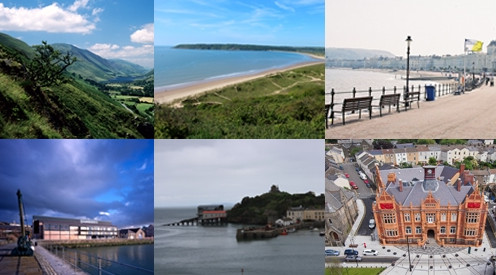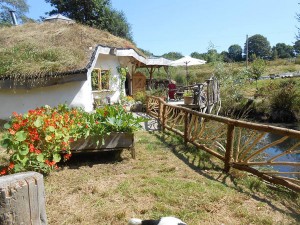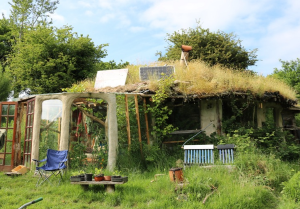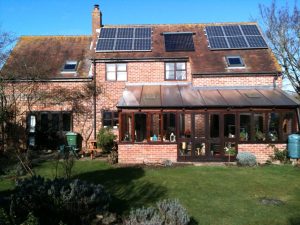We’re heading for environmental meltdown – how the planning system could help

As a professional planner (of the town and country planning variety) and fan of Low-impact Living I always expect to see demands or requests being made of the planning system to assist in attempts by individuals or groups to experiment or set examples where impact on the environment would be minimised. When these requests have been brought to my attention I’ve been happy to help, but lately my preoccupation has been on what will amount to a revolution in the scale of change required as society as a whole desires or is forced to lower its environmental impact. This transition is likely to be extremely traumatic and it is just possible that an element of planning could reduce the severity of the harm that will be caused to both individuals and society.
There are about 23,000 members of the Royal Town Planning Institute, all of whom should be aware of the urgent need for carbon emissions to be reduced (as soon as possible and to about zero by 2050). This might be only one measure of “sustainable development” but it is one that can be measured. In fact, a statutory duty is placed on those preparing development plans (usually referred to as local plans or neighbourhood plans) to ensure that these mitigate against carbon emissions and contribute towards the achievement of sustainable development.

Not all carbon emissions are attributable to the use and development of land and buildings (ie the extent of land-use planning control) but clearly a substantial proportion of future emissions will be. A ‘back of an envelope’ calculation shows that about 50% of emissions could come under the control of and be effectively eliminated by an intelligent use of the planning system; an amount that is non-trivial. To some extent these are ‘low hanging fruit’ but they are definitely worth picking and might not be dealt with either voluntarily or by any other existing regulatory system.
Those who have recent experience of the planning system will have noticed the extent to which the English language has been corrupted. This is not so much in the sense of planning jargon but in the distortion of the normal meaning of words such as “affordable” (meaning unaffordable), “sustainable” (meaning sustaining economic growth) and “viable” (meaning profitable). These distortions and others are the most obvious signals that the planning system has been captured by vested business and financial interests. However, this has been made possible by the absence of participation by those with other and countervailing interests, including a concern that the journey along a low-carbon pathway should be started now and be as smooth as possible.

The planning system has developed a very open aspect towards the public – more so than in any other field of public life, for example education, transport, agriculture, health, or the military. Planning authorities, supervised by the courts, would experience some difficulty in resisting efforts to ensure that the words that appear in national policy (e.g. the National Planning Policy Framework) and in the relevant legislation are given their proper meaning. As an example, a planning inspector described sustainable development as that which, “would consume its own smoke”. This seems to be incontrovertible but has not become common currency in the making of planning decisions.
There may be many trials and tribulations to follow, but this would be a sensible starting position. Those interested in how the planning system could be used to reduce carbon emissions by 50% could be interested in a guide prepared for that purpose at: http://bit.ly/2asiQML
And, on an ongoing basis, at www.dantheplan.blogspot.com
The views expressed in our blog are those of the author and not necessarily lowimpact.org's
9 Comments
-
1Marc September 4th, 2016
If the planning system is really going to support low impact living and get the greatest possible benefit from it we need low impact enterprise zones around towns so that getting permission is easier and low impact development can grow in a coherent way. It can then feed into towns through the revitalisation of local markets and breakdown the us/them barriers which seem to exist and often stand in the way of people getting permissions in the first place. Having said that I personally would vote for almost anyone who would pleadge to turn off the power stations every day when consumption reached the o e planet threshold (yes I know there technical issues with that). This would focus on how we use the energy and provide an impetus for off grid and renewable energy creation.
-
2Dave Darby September 4th, 2016
Great idea, but as the UK has a (roughly) three-planet footprint, I don’t think that any politician committed to switching off the energy supply when it gets to a third of its current level is going to get many votes. So we’d have to think of another way of implementing it than the parliamentary route. That’s the problem isn’t it – there are lots of great ideas out there, but within the current system, not many ways of implementing them. The really good ideas tend not to be good for corporate profits, and so if introduced by a particular country, would induce corporate investors to withdraw funds and eventually bankrupt the country – no conspiracy required, just a world split into blocs competing in a corporate-dominated system. There are people (very clever and capable people) building alternatives – we just need to come up with ways to help them grow their sectors.
-
3Daniel Scharf September 4th, 2016
Low impact enterprise zones might be a good idea in theory. However the Guide has been written on the basis that there are sufficient hooks and handles in planning law and policy as it currently exists to effect substantial change (eg reduction in carbon emissions). The main problem is that the system is not being used in a determined way by those with a ‘low impact’ agenda, some of whom believe that changes to law and policy are required first. It does not seem to be a sensible approach to give up any opportunity (engagement with plan-making and decision-taking) whilst waiting for changes that are unlikely to actually happen. Having said that, it might be possible find a neighbourhood forum prepared to incorporate polices equivalent to what Marc envisages to be a low impact enterprise zone, including the use of Community Right to Build Orders see http://mycommunity.org.uk/resources/understanding-the-community-right-to-build/
-
4Dean of the portable village September 5th, 2016
the statment in the planning to reduce carbon emissions that says
“for instance dispersed settlements typically result in higher levels of greenhouse gas emissions and resource consumption” etc that makes me think he would not advocate a rural living situation for more people. ? why is this statment in the planning to reduce carbon emissions paper ? if people not require to travel for most of there needs including going elsewhere to work why would it increase emissions.
-
5Dave Darby September 5th, 2016
(Correct me if I’m wrong Daniel) – but by dispersed settlements he means towns and cities, and how journeys to work are shorter and easier to do on public transport if the city is compact (like European cities) rather than dispersed (like US cities – especially Los Angeles, where everybody drives everywhere). In the guide he offers support for the Ecological Land Co-op etc.
-
6Daniel Scharf September 6th, 2016
Dean
Thanks for your comment. The quote is actually from a recent publication from the Royal Town Planning Institute which the Guide suggests that its understanding of the situation could be improved. My view is that attention must be focused on the 7 billion plus (possibly over 50 million in this country) set to live in urban areas in the next 50 years so that urban life is made carbon neutral or negative. I cant see a way to reverse those trends but am certainly not against low carbon living in rural areas – see section on food and blogs on http://www.dantheplan.blogspot.com
-
7Dave Darby September 7th, 2016
Hi Daniel. I think you’re right about city living – but I’m a director of the Ecological Land Co-op, and we’ve just got a piece of land in Sussex for our second settlement. So we’re gearing up for the inevitable battle with the planners – just like the battle for the first settlement, in Devon, which was won at appeal. Lammas and many people trying to live on their smallholdings (even under the one-planet development policy) have faced similar battles. It seems that Yorkley Court and Steward Wood have lost theirs. Trying to move to the countryside if you don’t have much money but you have skills to contribute towards building a sustainable, working countryside will always involve an exhausting and expensive battle with the planners. I think the way to reverse the trend towards urban living is for planners to help these people instead of hindering them. I don’t know how that can be achieved though – any thoughts?
-
8Daniel Scharf September 8th, 2016
Dave, I think that ELC have the best available model for developing and operating smallholdings in a cooperative way and in the Greenham Reach case persuaded the inspector to trust that the joint enterprise could be sustained. However, I see these initiatives as a response to the prohibitively high land prices on the edge of settlements where I (and Colin Tudge) believe that village farms should be established for social, economic and environmental reasons. The mechanism, which is set out in Dantheplan does admittedly depend on securing affordable land and associated housing from new residential developments )ie through section 106 obligations). This would benefit from policies in local and neighbourhood plans. Community Right to Build Orders (referred to in both Dantheplan and the recent CPRE report to which Zoe contributed) would require change to the Regulations.
-
9Dave Darby September 9th, 2016
Yes, Simon Fairlie would like to see self-build / one-planet type developments around the edge of settlements, maybe with not very much land – to provide housing for people with the craft skills to provide products and services to town and country – blacksmiths, market gardens, timber yards, furniture-makers, thatchers etc.
CPRE (surprisingly, maybe) praised what the ELC are doing. I’d like to see it scaled up hugely, and lots of other groups doing it too. Sounds like there might be another blog article there (from ‘the mechanism’).




 How Charlie and Meg’s self-built, natural home finally received planning permission with the help of the One Planet Council
How Charlie and Meg’s self-built, natural home finally received planning permission with the help of the One Planet Council
 To all environmental groups: lifestyle change isn’t going to be enough to avert ecological catastrophe
To all environmental groups: lifestyle change isn’t going to be enough to avert ecological catastrophe
 The Ecological Land Co-op has purchased more land to create ecological smallholdings
The Ecological Land Co-op has purchased more land to create ecological smallholdings
 Having a £3k eco-home is more about attitude than building codes or regulations: interview with Tony Wrench
Having a £3k eco-home is more about attitude than building codes or regulations: interview with Tony Wrench
 Wales’ unique ‘one-planet’ planning policy and the Lammas Ecovillage
Wales’ unique ‘one-planet’ planning policy and the Lammas Ecovillage
 Review of ‘Extinction: A Radical History’ by Ashley Dawson
Review of ‘Extinction: A Radical History’ by Ashley Dawson
 New Ecological Land Co-op share offer launched: here’s a chance to help bring about change in land ownership in the UK, and receive 3% interest for your trouble!
New Ecological Land Co-op share offer launched: here’s a chance to help bring about change in land ownership in the UK, and receive 3% interest for your trouble!
 New planning developments might allow a lot more people to build their own home
New planning developments might allow a lot more people to build their own home
 Land reform
Land reform
 Planning permission
Planning permission
 The 'nature problem'
The 'nature problem'


